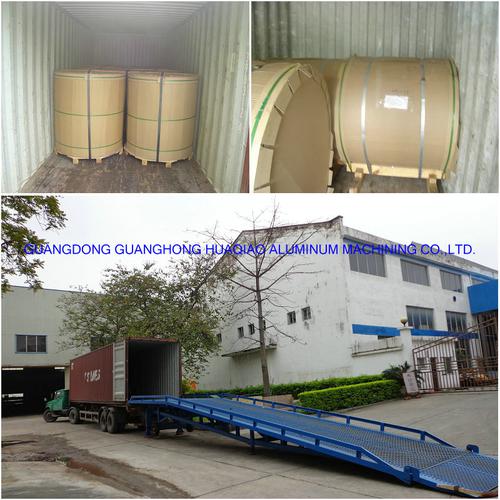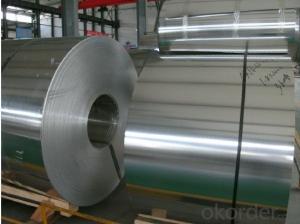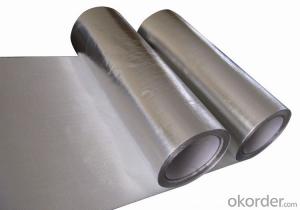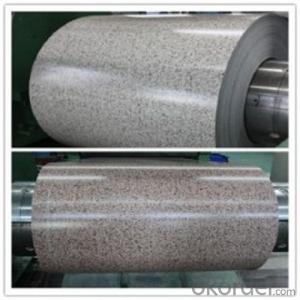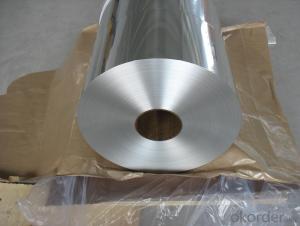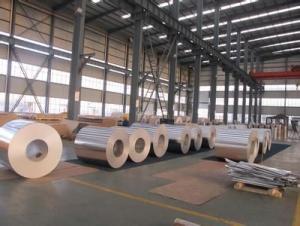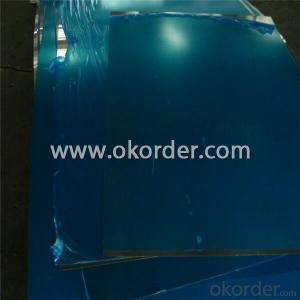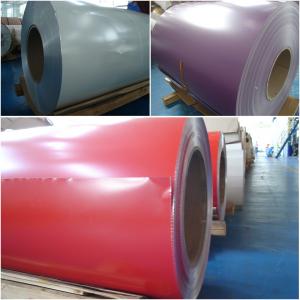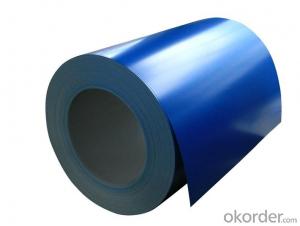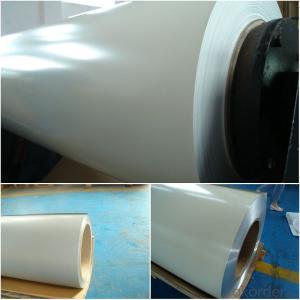9,000 Kilogram Aluminum Sheet Coil Packing
- Loading Port:
- China Main Port
- Payment Terms:
- TT OR LC
- Min Order Qty:
- -
- Supply Capability:
- -
OKorder Service Pledge
OKorder Financial Service
You Might Also Like
Featuresof PVDF Aluminum Coil:
1. Adoptingprecision rolling coating technology, our PE coated coil can ensure excellentadhesive without coating omission.
2. For the PVDFcoated aluminum sheet we produced, there are various colors for your choice.
3. Usinginfrared heating technology to protect environment from pollution.
4. Ourcoated aluminum coil has four-roller coating line, uniform coating thicknessand good features.
Raw Materialof the PVDF Coated Aluminum Coil:
1. AluminumCoil: high strength aluminum with alloy of AA1100 (aluminum alloy is availablewith AA3003, AA3005, AA5005 according to customer)
2. SurfacePaint: PE, PVDF and special paints.
Specificationof the PVDF Coated Aluminum Coil:
Width: 20mm~1590mm
Thickness:0.06mm~1.0mm
ExternalDiameter: ≤ 1500mm
InternalDiameter: 405mm, 505mm, 150mm, 75mm
Coil weight:≤ 4000kg
Performance and usage
PVDF coated aluminumcoils are specially processed through the technics of roller coating and bakingwith precise paints from BECKER INDUSTRIAL COATINGS in
Performance of the coating
Aluminum Thickness | Coating Thickness | MEK | T Bend | Impact | Adhesion | Pencil Hardness | Boiling Water Proof |
0.3-1.5mm | ≥25μm | ≥100 Times | ≤2T | 50kg•cm | 0 Grade | ≥HB | no change within 2 hours |
0.15-0.28mm | ≥25μm | ≥100 Times | ≤2T | 20kg•cm | 0 Grade | ≥HB | no change within 2 hours |
Color ofCard
Our PVDF coated aluminum coil is made offluorine carbon resin, pigment, ester solvent after high temperature roastingand baking. The paint of this PVDF coated aluminum coils are solidified to dryfilm with super weather resistance. PVDF coating also can be classified astraditional PVDF and nanometer PVDF coating.
A. Traditional PVDF Coating, with KYNAR500 PVDF and two or three times forcoating and baking, has good properties of anti-acid, anti-alkali and isdurable in atrocious weather and environment, keeping 15 years no unwontedfading. In view of these facts, we recommend this PVDF coated aluminum coilsare applied for external wall cladding.
B. Nanometer PVDF Coating, which different with traditional PVDF, is the clearcoating. It contains nanometer element, which can protect panel from pollution,because nanometer has self-cleaning effect, it is easy to get rid of dust andpollution by raining or water.
Color Match
For custom' color requests, we can deal as following:
1. Supply a physical sample of custom color. A color sample on metal ispreferred. If other, it is also acceptable. But the color matching rate may benot good as color on metal.
2. New color sample is usually offered by our paint supplier in 5-7 days,special color should be in 7-10 days.
3. Upon receipt of color sample, please approve in writing as soon as possible.Once you approved, we will arrange purchasing and production.
Note: Color difference maybe occurred in different production batch, soit is suggested all panels are placed in one order for same project. And keepsame direction as arrow on protective film when installing to avoid any colordifference by vision.
- Q: Can aluminum coils be used for electrical transmission lines?
- Aluminum coils find common use in electrical transmission lines due to their numerous advantages. Firstly, aluminum, being a lightweight material, facilitates easier and more cost-effective transportation and installation. Secondly, aluminum exhibits good electrical conductivity, comparable to that of copper. Thirdly, aluminum proves to be a more economical choice for long-distance transmission lines, as it is less expensive than copper. Nonetheless, there are certain challenges associated with employing aluminum coils in transmission lines. Notably, aluminum possesses a lower tensile strength than copper, rendering it more susceptible to sagging over extended distances. Moreover, aluminum boasts a higher thermal expansion coefficient than copper, potentially giving rise to complications related to thermal expansion and contraction. Nevertheless, through proper design and engineering, aluminum coils can be effectively and efficiently utilized in electrical transmission lines.
- Q: Can aluminum coils be utilized as a material for crafting jewelry?
- <p>Yes, aluminum coils can be used for making jewelry. Aluminum is a lightweight, durable, and affordable metal that is often used in costume jewelry and for decorative purposes. It can be easily shaped, bent, and manipulated into various forms, making it suitable for creating intricate designs. However, it's important to note that aluminum is a softer metal and may not be as durable as other metals like stainless steel or silver, so it may not be ideal for pieces that will be worn daily or subjected to significant wear and tear.</p>
- Q: why is aluminum oxide used more frequently than silicon carbide as an abrasive?What r the different types of tool feed mechanism in USM process.
- Aluminum oxide and silicon carbide are used to grind two completely different sets of materials. Steels and other ferrous alloys are best ground with an aluminum oxide wheel, and the majority of grinding tasks are grinding ferrous alloys. At home, tools are made of steel, and so home bench grinders come with Al2O3 wheels. The same with handheld angle grinders - most welding is done with ferrous alloys. For aluminum and carbides, a silicon carbide wheel will yield better results.
- Q: Are aluminum coils suitable for architectural cladding applications?
- Yes, aluminum coils are suitable for architectural cladding applications. Aluminum is lightweight, durable, and corrosion-resistant, making it an ideal material for cladding buildings. It can be easily formed into various shapes and sizes, allowing for creative and unique designs. Additionally, aluminum coils offer excellent weather resistance, low maintenance requirements, and a wide range of color options, making them a popular choice in architectural cladding projects.
- Q: Are there any specific certifications or qualifications required for aluminum coil suppliers?
- Certifications and qualifications that are essential for aluminum coil suppliers do exist. The ISO 9001 certification is a vital one for these suppliers as it guarantees the implementation of a quality management system and adherence to international quality standards. When a supplier possesses this certification, it demonstrates their effective quality control processes, consistent product performance, and ability to satisfy customers. Another critical qualification for aluminum coil suppliers is the AS9100 certification, particularly for those serving the aerospace industry. This certification verifies that the supplier has fulfilled the industry-specific requirements for quality management systems, including rigorous quality control, traceability, and compliance with industry standards. Moreover, aluminum coil suppliers may also need to conform to industry-specific standards like the ASTM standards or the REACH regulations of the European Union concerning chemical substances. These standards ensure that the supplier's products fulfill the necessary specifications and are safe to use in various applications. Furthermore, certain aluminum coil suppliers may possess specialized certifications or qualifications tailored to specific industries or applications. For instance, suppliers serving the automotive industry may hold certifications like the IATF 16949 certification, which demonstrates their ability to meet the demanding requirements of automotive manufacturers. In conclusion, while the specific certifications and qualifications required may vary depending on the industry and application, it is crucial for aluminum coil suppliers to possess certifications like ISO 9001 and industry-specific certifications to ensure their products meet the required quality standards and comply with relevant regulations.
- Q: What are the common fabrication techniques for aluminum coils?
- The common fabrication techniques for aluminum coils include hot rolling, cold rolling, annealing, slitting, and coating.
- Q: Why does it take less energy to get aluminum metal from used cans than to get it directly from the ore?
- in order to extract the raw aluminum, you have to heat everything and melt it first, then remove the stuff that precipitates out as it cools or forms via chemical reaction with catalysts you introduce. With aluminum cans, you don't have to raise the temperature much above the melting point of aluminum, since it's already the substance in the can with the highest melting point. With aluminum ore, there can be anything in the ore with pretty much any melting point. In particular, if the ore contains an alloy of aluminum and a metal with a higher melting point than aluminum, then rest assured, you will have to raise the temperature of the ore above the melting point of aluminum in order to melt that alloy, In any case, because the maximum required temperature of the smelter needed to melt used aluminum cans is necessarily lower than the maximum temperature required to work with the ore, less energy is required to get aluminum from used cans than from ore.
- Q: Can aluminum coils be used in the aerospace industry?
- Yes, aluminum coils can be used in the aerospace industry. Aluminum is widely used in the aerospace industry due to its desirable properties such as low density, high strength-to-weight ratio, and excellent corrosion resistance. Aluminum coils are often used in the manufacturing of various aircraft components such as fuselage panels, wings, and structural frameworks. The coils can be easily formed into different shapes and sizes, providing flexibility in design and reducing the overall weight of the aircraft. Additionally, aluminum coils are compatible with different manufacturing processes like welding, machining, and forming, making them an ideal choice for the aerospace industry.
- Q: Can aluminum coils be used for gutter systems?
- Yes, aluminum coils can be used for gutter systems. Aluminum is a popular material for gutters due to its lightweight nature, durability, and resistance to rust and corrosion. Aluminum coils are often used to form seamless gutters, which offer advantages such as fewer leaks and a more aesthetically pleasing appearance. Additionally, aluminum gutters are easy to maintain and can be painted to match the exterior of a building. Overall, aluminum coils are a suitable and commonly used choice for gutter systems.
- Q: I need to make aluminum powder that is fine! I don't have a mill to use or something like that. If I fill literally the whole coffee blender, will that get it fine? I want to make an ok amount of it. I tried to use sand paper which makes it as fine as I want it but takes a while of sanding.
- Dissolve it with an acid--vinegar's your best bet there unless you've got a way to get a hold of a stronger acid that'll do this quicker. Once all the aluminum's dissolved, put in some magnesium like you can get from one of those fire starting tools that's just a brick of magnesium with a spark strip on it. The magnesium will ionize and the aluminum will precipitate out of the solution. Add the magnesium in as small of individual quantities as you can, too, to keep the size of individual precipitate particles down. Also, I recommend neutralizing the acid before adding the magnesium in case there's any acidity left--baking soda will work fine and doesn't stink like ammonia. If the solution's too acidic when you add the magnesium, the magnesium will go for the acid instead of the aluminum.
Send your message to us
9,000 Kilogram Aluminum Sheet Coil Packing
- Loading Port:
- China Main Port
- Payment Terms:
- TT OR LC
- Min Order Qty:
- -
- Supply Capability:
- -
OKorder Service Pledge
OKorder Financial Service
Similar products
Hot products
Hot Searches
Related keywords

